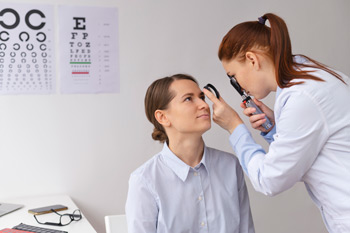Vision Insurance
Get a free vision insurance quote

- Choose the right insurance
- Business Insurance
- Business Owner’s Policy
- Commercial Auto
- Commercial Property
- General Liability
- Life Insurance
- MIA Dental Insurance
- MIA Vision Insurance
- Professional Liability
- Surety Bonds
- Workers Compensation
- Select state
- Arizona
- Illinois
- Indiana
- Nevada
- New Mexico
- Texas
While every aspect of our health is important to our daily lives, few things are more alarming than a sudden eye problem.
It’s not just trouble seeing – you’re suddenly unable to perceive the world around you in a way that you could before. Your entire worldview, so to speak, will start to change. That’s why taking care of our eyesight is extremely important.
But with the rising costs of daily necessities and healthcare, it’s easy to wonder where we can get the amount we need to have decent eyecare.
That’s where vision insurance comes in. By paying a regular premium, eye care services can become much more affordable.
Who Should Get Vision Insurance?
Vision insurance isn’t included in your regular health insurance policy, and you will often have to buy or opt into it separately.
That’s because many people skip vision insurance because they think that the money could be better spent somewhere else, especially if they still have good eyesight.
The common misconception is that vision insurance is not as critical as traditional health insurance. People think that the benefits are minimal,
Granted, vision insurance might not be as critical as traditional health insurance.
The stakes or risks of not getting insurance aren’t that high, at least when compared to the stakes of traditional health insurance. Thus, for many people, the benefit that they can get from vision insurance might be minimal.
But there are specific situations when it might be more beneficial for someone to get vision insurance, such as the following:
- Older individuals. Older individuals are more prone to eye-related conditions, such as glaucoma or cataracts. Eye exams can also uncover other illnesses such as thyroid issues, high cholesterol, etc.
- Young children. Children need to have regular eye exams because they don’t know what good vision is supposed to be and can nurse bad vision for a long time.
- Already need vision care. If your vision is already suffering from disease, old age, etc., your healthcare needs might be lesser if you have vision insurance to supplement the costs of eye care.
What is Vision Insurance?
Whether you’re already wearing eyeglasses or still have perfect vision, caring for your eyes is a good plan. Your vision is important to maintain a good quality of life, and even the slightest discomfort can have staggering consequences.
Vision insurance benefits can drastically reduce the expenses you might incur for vision-related problems and emergencies.
The coverage of this specific type of insurance includes preventive care and corrective care like contact lenses or glasses. Some even offer discounts on ophthalmological procedures like LASIK.
Without vision insurance, you will likely spend hundreds and thousands of dollars for these services.
This insurance policy is typically separate from your traditional health insurance. But to save costs, you’ll often see it bundled together with dental insurance. It’s also often offered by your employer with appealing group rates.
But if you don’t have access to workplace benefits, you’ll have to do a little bit of shopping around to find the right insurance plan for your needs.

Types of Vision Insurance
Just like regular health insurance, you can get vision insurance in different forms and through different channels.

- Employer
- Associations/organizations
- School district
- Government programs (Medicare or Medicaid)
- Individual policies
Here are the types of vision insurance that you are likely to encounter when shopping for the right plan.
What Does Vision Insurance Cover?
Vision insurance can significantly reduce your expenses, but it’s important to remember that different insurance providers will have different limits, deductibles, co-pays, and even benefits.
Generally, though, vision insurance will likely cover the following vision care benefits.
Most vision insurance will completely cover routine eye exams, at least once per year. However, you will likely have a small co-pay. Any eye exams aside from the annual one are also likely to incur costs.
Your vision insurance plan will also cover corrective glass lenses and contact lenses. However, these will likely have a dollar limit; and anything beyond that will have to be shouldered by you.
For example, if your vision insurance plan has a $150 annual limit, this means that they won’t pay in excess of this amount. If the contact lenses prescribed by your provider cost $195, your vision insurance will only pay for the $150, and you will have to pay the $45 yourself.
Buying expensive contact or glass lenses will work the same way. The provider pays for the $150 limit, and you will pay for the rest.
Additionally, many vision insurance plans will just provide either one of those choices. Either you get a new pair of glasses for this period’s allowance or a pair of contact lenses. If you get glasses this year, you can opt for contact lenses in the next applicable benefits period.
Corrective eyewear will have allowances either once a year or once every two years.
Since eyeglass lenses and frames are priced and sold separately, they will also have a different coverage limit from your insurance policy. The same rule applies: your provider will set a limit, and anything outside of that will have to be shouldered by you.
The same allowance period also applies to eyeglass frames, either once a year or once every two years.
Aside from corrective eyewear, more expensive forms of vision insurance will also offer discounts for elective vision procedures such as LASIK and PRK.
How Much is Vision Insurance?
Vision insurance prices can vary due to a variety of factors.
Most people get their vision insurance policy from work. Employers can offer vision insurance policies at a lower rate because providers typically give discounts to large groups. You can save money by getting your insurance from your workplace.
If you can’t get group rates on vision insurance from employers or other organizations, you will have to find vision insurance providers yourself.
Individual vision insurance ranges from $16 to $20 per month. Some providers offer a range of $16 to $18, while others will vary for a little bit, around $17 to $20.
Nevertheless, most basic vision insurance coverage costs less than $20 every month.
Another thing to note is that vision insurance prices will not change even if you have preexisting conditions. After all, the benefits of vision insurance are typically limited to eye exams and corrective products and services.
Buying the Right Vision Insurance Plan This 2022
A good vision insurance plan will save you a lot of money on your eye care maintenance. If you feel like you need one, it’s best to get your plan from your employer or organization in order to save money.
However, if you can’t get those benefits, you will need to get a vision insurance quote from a provider of your choice.
If you want to have the best vision insurance for your needs, Mia Insurance is the answer. Our expert agents will take care of your needs during the quotation process, and we’ll be sure to match you with the best policy for your specific situation.
Mia Insurance guarantees to deliver a fast, hassle-free, and budget-friendly experience. Call us now for a quote!
Get a free Vision Insurance quote today
- Choose the right insurance
- Business Insurance
- Business Owner’s Policy
- Commercial Auto
- Commercial Property
- General Liability
- Life Insurance
- MIA Dental Insurance
- MIA Vision Insurance
- Professional Liability
- Surety Bonds
- Workers Compensation
- Select state
- Arizona
- Illinois
- Indiana
- Nevada
- New Mexico
- Texas
Is there a local Vision Insurance agent near me?
Try our Location Finder to find the nearest agent near you.